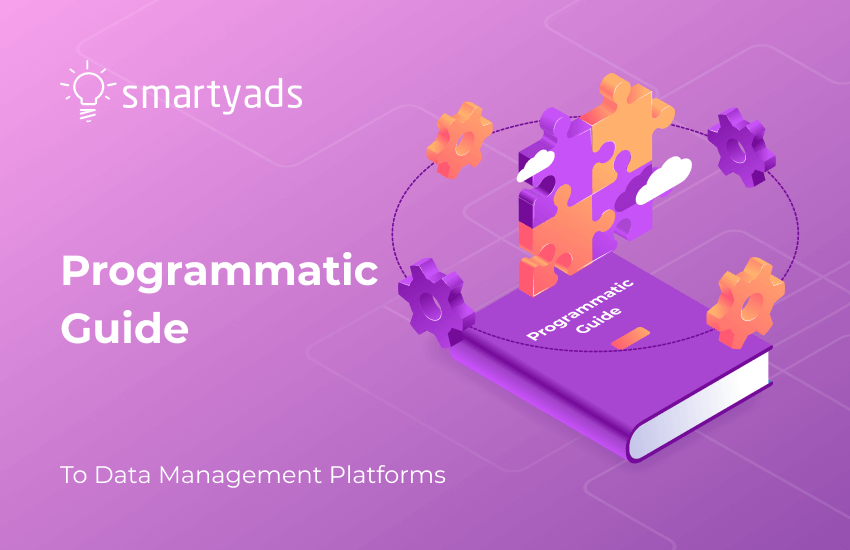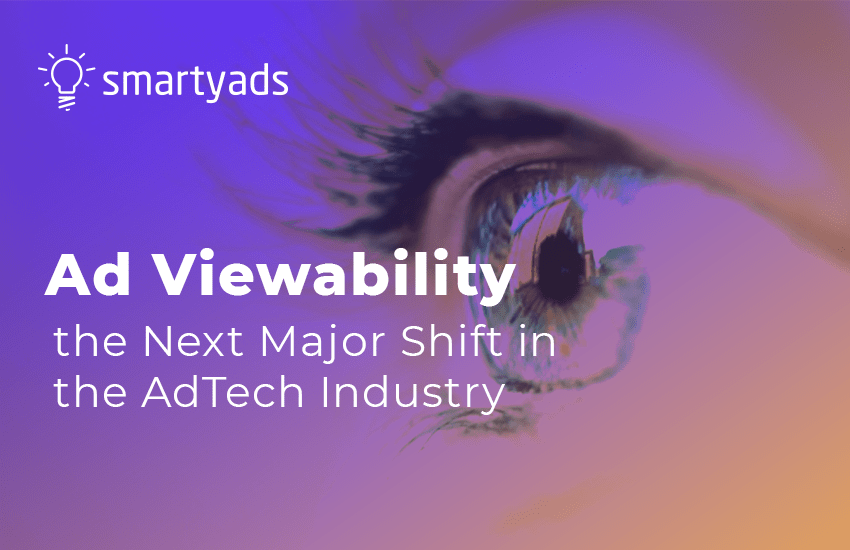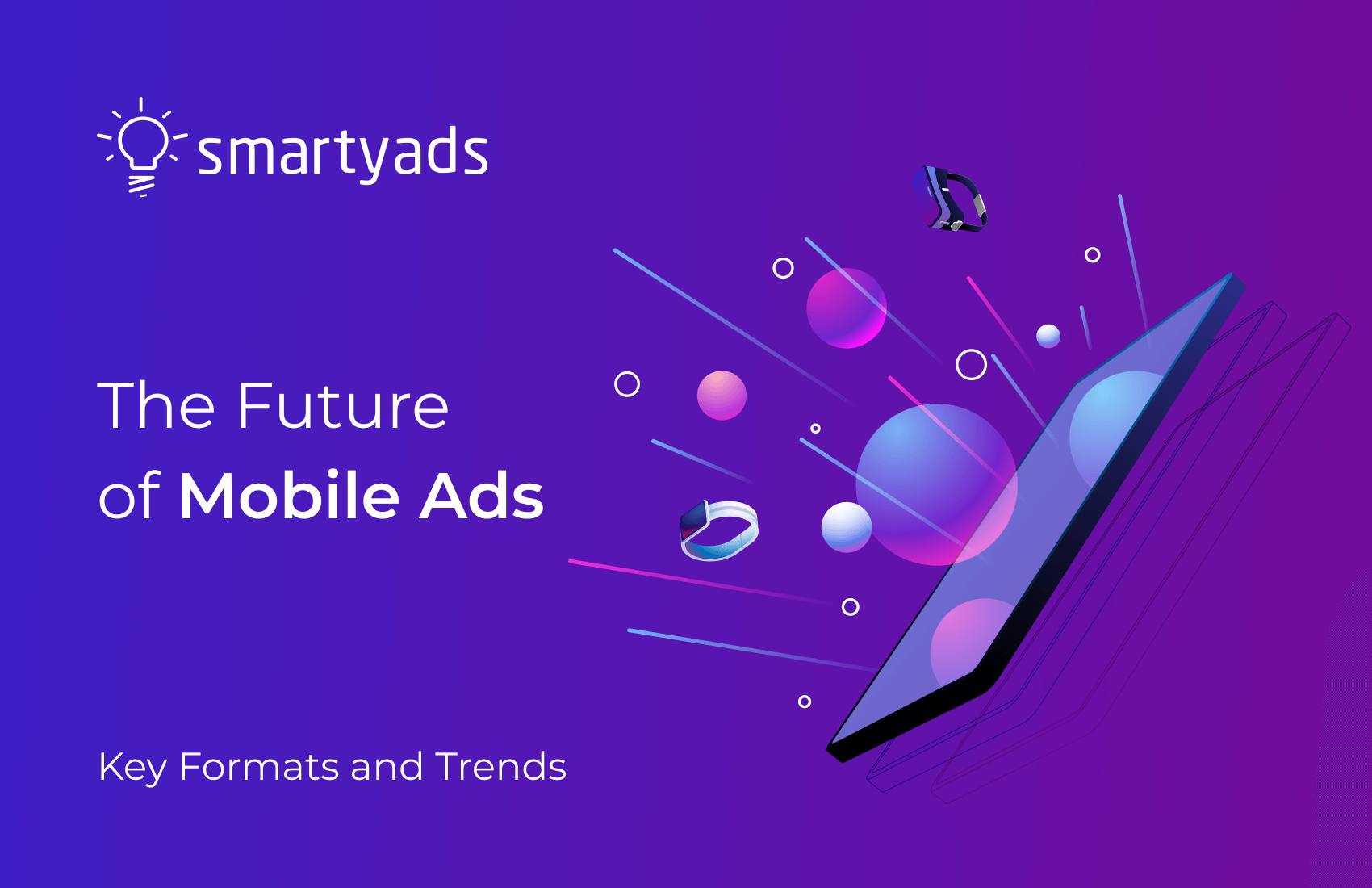In case you missed what ChatGPT is,
What you need to know about ChatGPT's work
ChatGPT is taking the tech world by storm because it’s fundamentally different from other AI technologies.
It is based on natural language processing and incorporates deep learning technology responsible for providing intelligent and relevant responses to the query it receives. Previously chatbots were mostly providing pre-programmed answers to queries. In the case of ChatGPT, the algorithm enables a chatbot to respond more dynamically, which becomes possible thanks to the GPT 3.5 neural network (a pretty smart AI model trained by OpenAI).
The AI trainers adjust the system with Reinforcement Learning from Human Feedback (RLHF). The involvement of RLHF improved the basic GPT-3 towards understanding more subtle nuances of user queries, eliminating the chance of error.
How does RLHF do it? With a reward model — a bunch of responses is gathered and compared with each other and ranked based on the quality of the received data (the model has 175B parameters).
When a system provides multiple responses on a particular topic, human AI trainers rank those responses by quality from the worst to best. The system then gets rewarded when it starts to provide better results for the requests.

Abilities and limitations
As a language AI model, ChatGPT can be applicable for various tasks, such as essay writing, composing emails, providing replies in the chat, and even coding and debugging.
Apparently, Microsoft will be among the first tech players to take advantage of ChatGPT. At the beginning of March, the corporation may actually update Bing with ChatGPT capacity, which will diversify the search results with alternative responses for users. With OpenAI and ChatGPT developments onboard, Bing, at some point, may really compete with Google.
However, it doesn't seem like tomorrow’s reality. Yes, ChatGPT can answer some queries very accurately. However, when a user enters a question into Google, the search result page leaves them with links to different websites to choose from. The user is responsible for clicking on these links and finding the information.
ChatGPT so far works differently — it just provides a single unambiguous answer, and this answer may be wrong. So, basically, ChatGPT algorithms will most likely be incorporated into Bing to diversify search results instead of narrowing them down to one answer.
ChatGPT is still a language AI model and thus can provide wrong replies to queries. In fact, because of this, StackOverflow recently banned technology because it failed to reach a sufficient rate of correct responses when posting answers. And, when the overall rate of correct replies is low, it can negatively impact the website and user experience for those looking for the right answers.
ChatGPT is sometimes amazing, and sometimes hilariously wrong. Here, it confidently explains to me why an abacus is faster than a GPU. pic.twitter.com/vpJZTStDnD
— Andrew Ng (@AndrewYNg) December 7, 2022
How is this problem should be solved? Well, exactly this thing called reinforcement learning from human feedback is supposed to gradually improve the system and polish it with the course of iterative deployments.
Joe Rogan was also sharing his ideas on this problematic side of technology; here’s what he said:
“ChatGPT is basically a predictive model that has been trained on a huge data set of written language. If it takes two words, it can predict what the third word will be. And as the algorithm evolves, these words turn into sentences, sentences into paragraphs — some of these statements can be clear, but others are dead wrong. The algorithm will learn more and more about different subjects across various sources, and at this point, the ability to fake expertise may go through the roof”.
Raising up the ethical questions
ChatGPT has sparked a significant controversy wrapped around the subjects of misinformation. For this reason, at least now, we should not expect AI to do all the thinking for us. People should still be responsible for their decisions — including what information to consume and which sources to believe. No matter how brilliant the algorithm is, so far, it is not reaching the depth of human intelligence, which is, however, really good at mimicking its form. This should be taken into account.
Society is also concerned about sustainability issues related to maintaining technological capacities. ChatGPT is very expensive to support because there are obviously many GPUs required to run the process. In fact, the cost of running ChatGPT reaches $100.000 per day. Because of this, questions arise as to which extent ChatGPT is sustainable and how long it can operate if it’s also resource-consuming, so it will take time for the creators to figure out how to deal with these issues.
How many GPUs does it take to run ChatGPT? And how expensive is it for OpenAI? Let’s find out! ð§µð¤ÂÂÂÂÂÂÂÂÂÂÂÂÂÂÂÂÂÂÂÂÂÂÂÂÂÂÂÂÂÂÂÂÂÂ
— Tom Goldstein (@tomgoldsteincs) December 6, 2022
The ethical questions are also touching upon improving the technology and turning it more intelligent. A recent investigation revealed that OpenAI used the services of a Kenyan company to pore over text that included disturbing content. For their efforts to label this content, some team members received less than $2 an hour. This also triggers social concerns regarding how the company approaches the process of technology improvement, as well as how wealthier countries keep exploiting workers from poorer countries in order to get financial benefits.
What does ChatGPT hold for marketing and ad tech?
Writing content for websites
ChatGPT can already be very useful for content marketers, advertisers, journalists, editors, and all people who work with content. The technology can swiftly come up with topics for articles, posts, and blogs. Moreover, it can even write them — not quite as deep as an experienced author but pretty much as a novice copywriter.
As we’ve already learned, technology can give wrong or biased answers; that’s why for the time being, it is better not to rely completely on the machine text but instead use the output as a canvas for more detailed editing.
In the same way, you can use ChatGPT to generate content for, let’s say, social media posts. Dean Seddon, CEO of MAVERRIK, decided to test it this way:
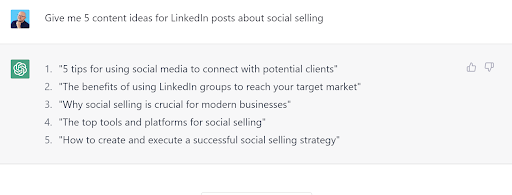
Image credit: Dean Seddon
Then, he asked ChatGPT to compose a short article for posting on Linkedin, and here’s what he got:
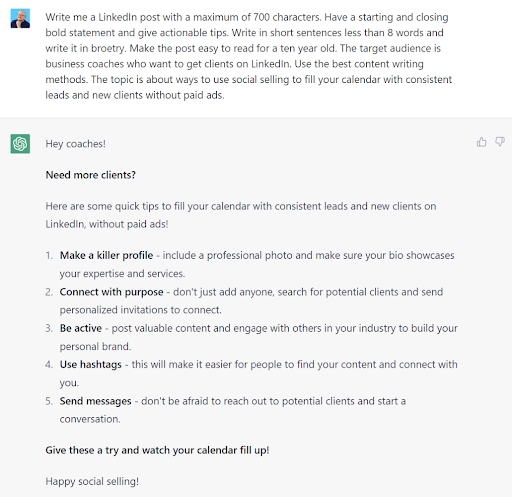
Image credit: Dean Seddon
Writing briefs, slogans, emails, and CTA
What are the examples of ai in advertising? For example, ChatGPT can generate titles and CTA’s for creatives. Sometimes they might turn out clumsy, but when there is no time, extra hands, or brains at your disposal, you can always use this option and retouch the output with some editing.
With ChatGPT, brands can play around with slogans and come up with creative briefs, craft emails, and entire articles. Creative agencies can also craft creative campaign outlines much faster to present them to their clients.
To illustrate this virtue of ChatGPT, let’s look at some examples that were already generated by Jon Loomer, the owner of the Power Hitters Club – Elite community:
The output:
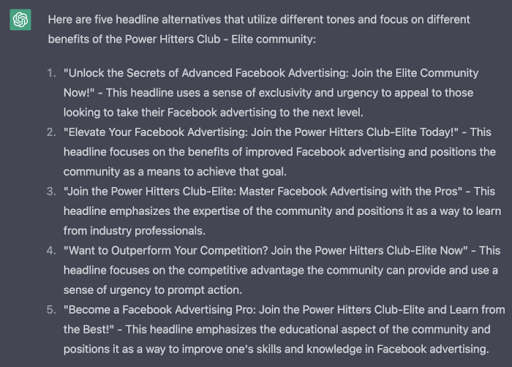
Image credit: jonloomer.com
Analyzing information for better targeting
Aside from generating editorial content, the model can help marketers target audiences more effectively by analyzing the markets or, let’s say, data in user profiles.
Even obtaining datasets for targeting is a tough task, but ChatGPT can provide here a quick solution. For instance, there was a case when ChatGPT was instructed to find a dataset for colleges in Nepal, and here are the outcomes of this work that were obtained:
As practice shows, with the correct approach, ChatGPT can even craft advertising strategies, which was always a prerogative of seasoned marketers.
Jon Loomer, the owner of the Power Hitters Club – Elite community, instructed the system to develop different advertising messages for his Power Hitters Club — Elite Community while focusing on various benefits and tones for each message. Then he asked for suggestions regarding the ad format and received this:

Image credit: jonloomer.com
And here’s what ChatGPT recommended for targeting:

Image credit: jonloomer.com
And that’s not the end of it; the system also provided recommendations for the advertising budget:

Image credit: jonloomer.com
And even some ideas about conversions:
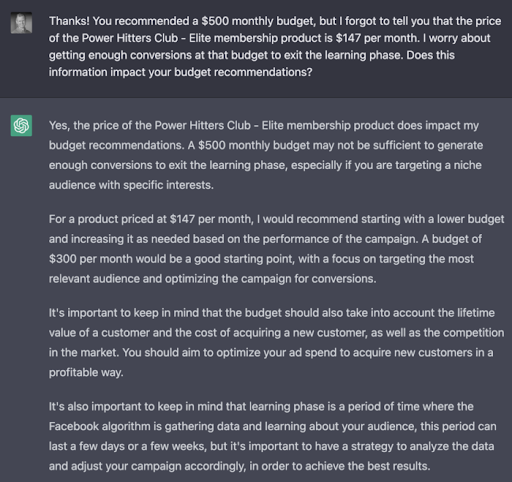
Image credit: jonloomer.com
Tracking conversions and user actions
For PPC marketers and SEO professionals, this technology can also eliminate pretty much a lot of heavy work. For example, to set up custom Pixel conversions to track user actions on the site. Let’s imagine you need to track some exclusive event, one that’s outside of Google Tag Manager functionalities. You need to be notified when the user opens the landing and scrolls more than 35% of it.
Now, you can just ask ChatGPT to “send Facebook pixel custom conversion event once as users scroll through 35% of the page using JavaScript”, and it will do it for you (source searchenginejournal.com).
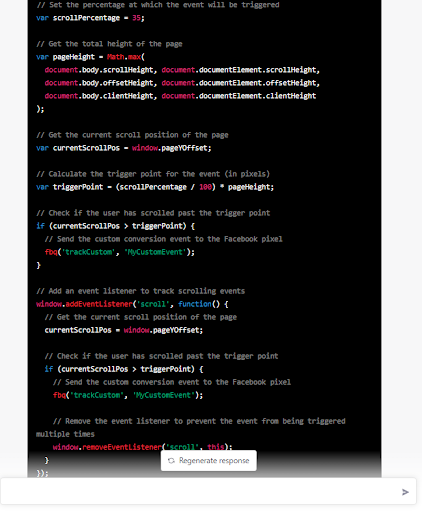
image credit: searchenginejournal.com
Boosting customer support
The idea of using AI chatbots for customer support is not new. However, the quality of customer support and troubleshooting with current AI can be disappointing.
ChatGPT can run multiple customer interactions quickly and efficiently, which will be a life-saving thing for a business that has a problem with customer support. A further boost in technology learning will also enable more accurate answers — this is supposed to cover a major pain point with chatbots. When this becomes possible, and the rates of incorrect answers of ChatGPT are eliminated to insignificant numbers, customers will be able to have organically unfolding conversations with chatbots that are really useful, correct, and up-to-date.
Composing regular expressions in Google Analytics
Composing regular expressions in Google Analytics is one of the dullest things marketers have to do nowadays. However, for those without a technical background, it can be less challenging with ChatGPT.
Now, marketers can ask ChatGPT: “compose regular expression that begins with “How To” or “What is” case insensitive using RE2 syntax” and get the following result: (source searchenginejournal.com).
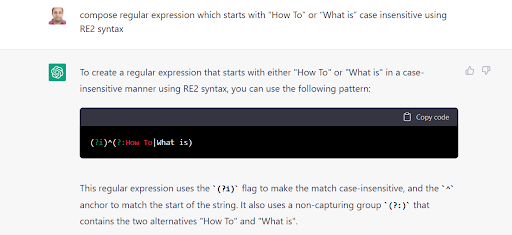
image credit: searchenginejournal.com
Composing really complex formulas in SpreadSheets
For starters, it takes time and effort to find the right function name to compose a formula for the Spreadsheet. Making a complex formula can be even more daunting unless a marketer uses ChatGPT.
A command to ChatGPT like: “Google Sheet formula which copies all rows from sheet1 where column "A" contains word "iPhone" will return the following results: (source searchenginejournal.com).
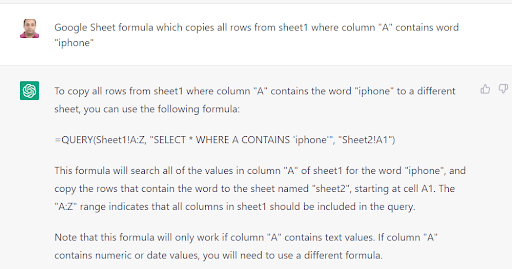
image credit: searchenginejournal.com
Optimizing website snippets
Marketers use many tools to dig for suitable keywords to optimize their content. Now, they can also do it with ChatGPT. They can also discover related questions that people normally ask. These questions, as well as zero-search volume keywords, can be very valuable for optimizing articles as well as website snippets.
For example, you can ask: what are related questions to "cozy cities in Germany", here are what suggestions you can use in content afterward: (source searchenginejournal.com).
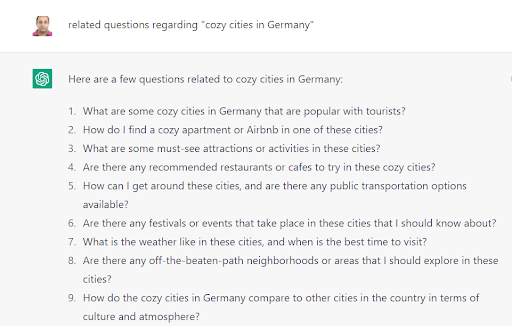
image credit: searchenginejournal.com
Fetching data from API
When you need to gather all the information in your store and neatly organize it in your GoogleSheet, it turns out ChatGPT can also be your assistant.
For example, you can ask: “google app script which fetches all product names and prices from WooCommerce REST API and adds into a spreadsheet” and then receive quite functional code: (source searchenginejournal.com).
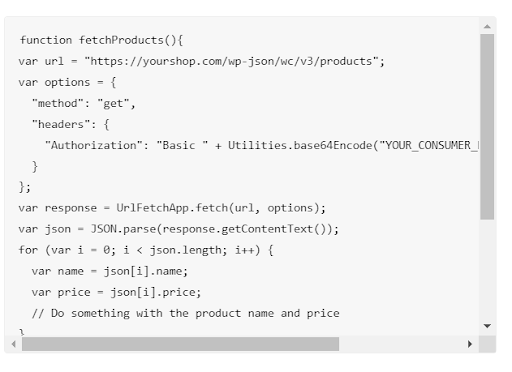
image credit: searchenginejournal.com
Coding
ChatGPT was praised for impressive results in code generation, which undoubtedly can come in handy for ad tech developers in the future. The front-enders will be happy to hear they can actually cut corners and save some tasks, especially for minor website adjustments. Instead of manually crafting the code, they can ask AI for help.
The volunteers asked ChatGPT to create a code for the rotating cube that will be placed on the website. Here’s what they obtained in less than a minute: (source babich.biz).
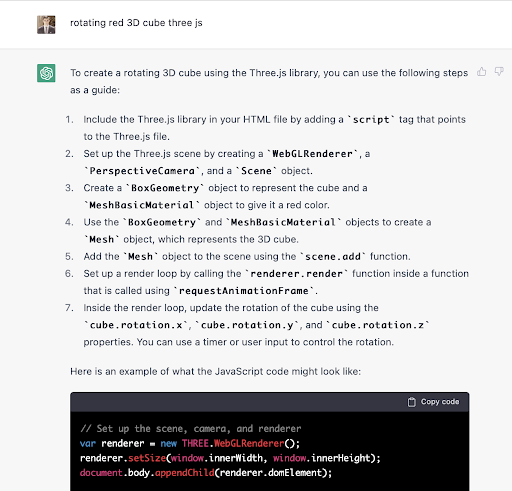
image credit: babich.com
Testing
There are numerous applications of ChatGPT for testing. One of them is writing a step-by-step outline for the usability test of a product. This way, a UX researcher can identify and address possible issues and challenges when users interact with a product, platform, or website. For example, you can ask ChatGPT to “draft 10 open-ended questions to ask participants” or “list 12 potential tasks to test in the UX study”. (source uxdesign.com).
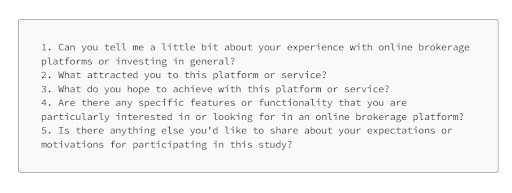
image credit: uxdesign.com
ChatGPT has a lot of potentials to work as a low-code solution for automated testing, for example, generating languages and libraries for Cucumber — a testing framework that applies behavior-driven scenarios. Such scenarios involve the natural language intent of testing along with the automation code that implements it. This helps testers to understand how the test code is related to the test intent, which is convenient for newbies.
However, users need some understanding of the app under test. They also need to know the coding language and packages used when generating code because the system often needs to be instructed on correcting mistakes.
When it comes to testing ad creatives, composing dozens of different ad variations is a super time-consuming process. This is where technologies like ChatGPT can easily step in with their ability to generate tons of alternative ad messages in seconds. This definitely makes it easier than ever to automate your ad creation.
Explaining things to your customers
Providing some actionable advice is something that was traditionally a task of account managers on the programmatic platform. With the development of ChatGPT, smart algorithms can be integrated directly into the platforms so that they would provide valuable suggestions right away. What is the most optimal frequency on DSP? ChatGPT already has some answers:
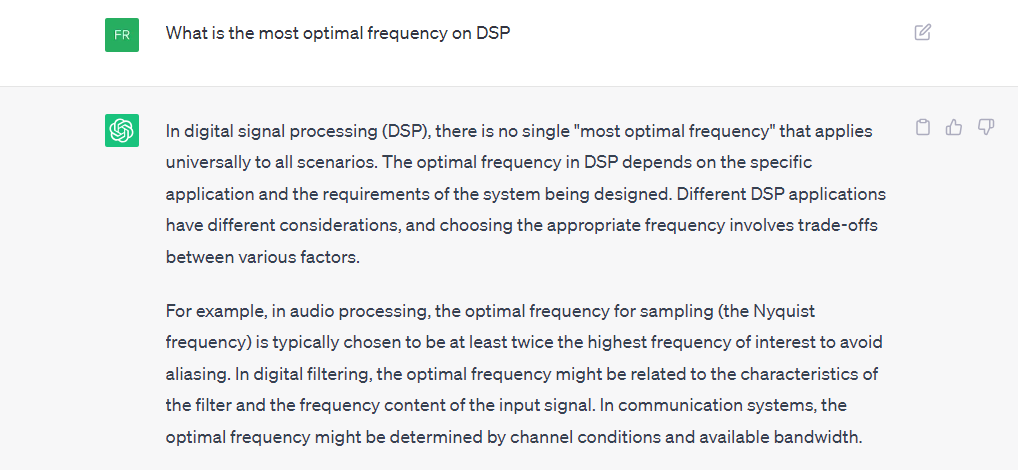
Helping with campaign optimization on DSP
Now ChatGPT also provides some valuable tips on how to optimize a particular kind of ad campaign on DSP.
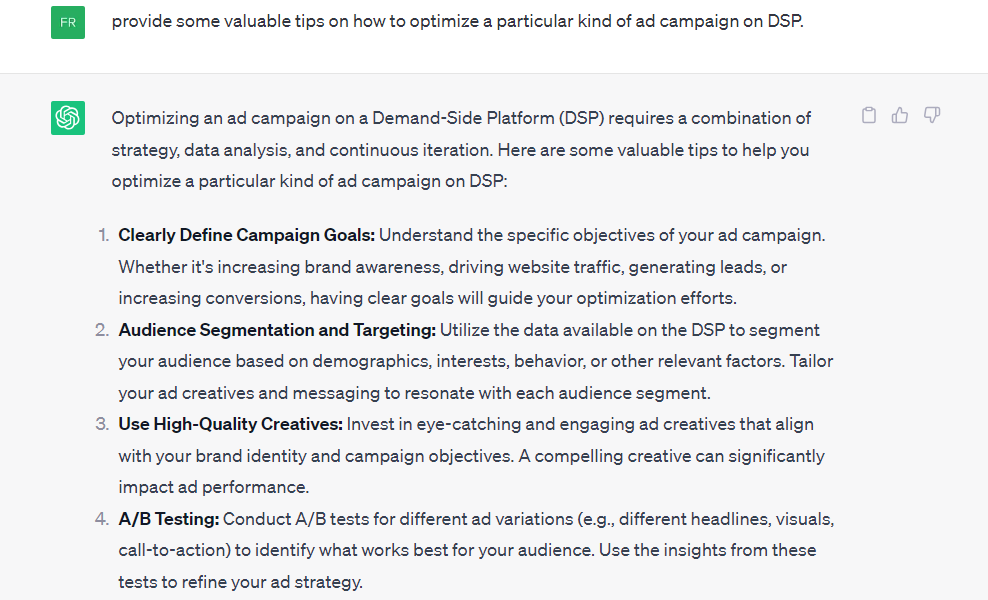
Writing entire scripts for banners and commercials
So far, we’ve learned that ChatGPT can generate quite interesting and creative texts suitable for various advertising purposes.
However, one should remember that setting the tone and the style of the commercial through the AI tool can be as daunting as instructing any other neural network to paint a picture by putting in a pile of keywords to the system. It needs a lot of details, and the result might not necessarily be what you had in mind. A good example of this is a Mint Mobile ad created by Ryan Reynolds with ChatGPT — hilarious and exciting but also somehow strange and terrifying.
This way, generated scripts require additional human retouching. Meanwhile, creative visions for large-scale ad campaigns, e.g., the Superbowl, will still need good taste and an understanding of human emotions, which AI alone can’t handle yet. Thus, while you can freely commission ChatGPT to write titles for your articles and campaign slogans, crafting the big-screen commercial is still better left to human professionals who understand the specifics of style, emotions, and subtleties of the core advertising message you are trying to convey.
Meanwhile, generating short scripts for Tik Tok campaigns is a starting point that can give the creative specialists a giant boost of inspiration and very valuable ideas, says Andy Gray, founder of Podcast Host. See how it can be done:
What is the future of ChatGPT in advertising?
Even though one can’t completely rely solely on AI in marketing activities, around 10% of Fortube 500 companies to apply AI tools in the content creation process in 2023. For instance, Emilie Gerber, Founder & CEO of Six Eastern, says they apply ChatGPT to write op-eds and to research topics valuable for their organization. Deloitte is currently consulting with various corporations to pinpoint how to implement OpenAI and ChatGPT to streamline some marketing workflow in their organization.
Although it’s not perfect yet, ChatGPT can still simplify a lot of work in the marketing department, which human professionals can then polish. As numerous experiments showed, what ChatGPT can do today is already outstanding. However, even with this, we’ve barely scratched the surface of what will become possible.
If you plan to involve ChatGPT in your creative strategies, just remember that the more detailed your prompt, the more robust the outcome will be. You also need to define the critical areas where AI tools like ChatGPT can be applied and where the application of artificial intelligence really makes sense and has a purpose.
Wrapping it up
ChatGPT, so far, is the most advanced AI technology — in mere seconds, it can come up with creative slogans and texts for articles, emails, or commercials. It has the potential to automate customer service interactions and the routine work of marketers who research the market and do their best to fine-tune ad messages to the various audience segments. It is not perfect yet and has some shortcomings of its predecessors; however, when those are resolved, the daily grind of advertisers and marketers will most likely be completely redefined.
ChatGPT is a technology that attracted over 1 million users in mere weeks after release; in 2023, it is expected to gain $20 million in revenue, and in 2024 over $1 billion. Very soon, Microsoft will expand access to ChatGPT through its new Azure OpenAI service; along with this, the corporation plans to make a $10 billion investment to fund OpenAI.
Right now, ChatGPT is the most advanced AI-driven technology of a kind, so it attracted even more attention than Google's Al LaMDA or Meta's BlenderBot.

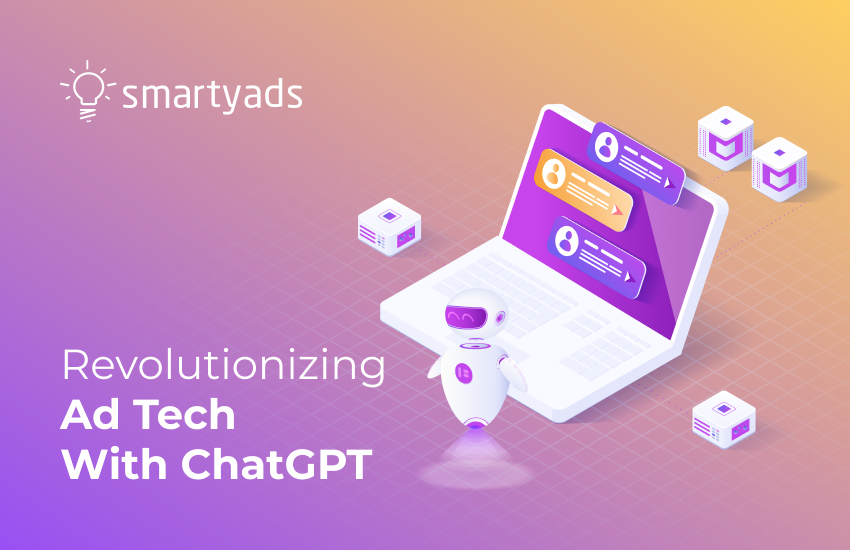
.webp)
